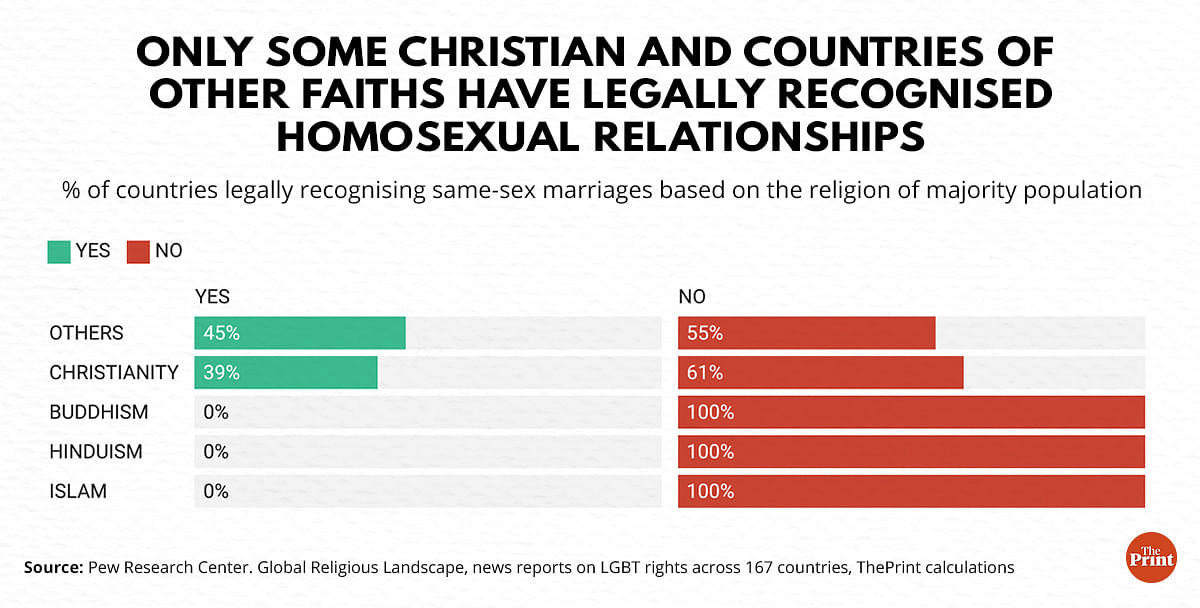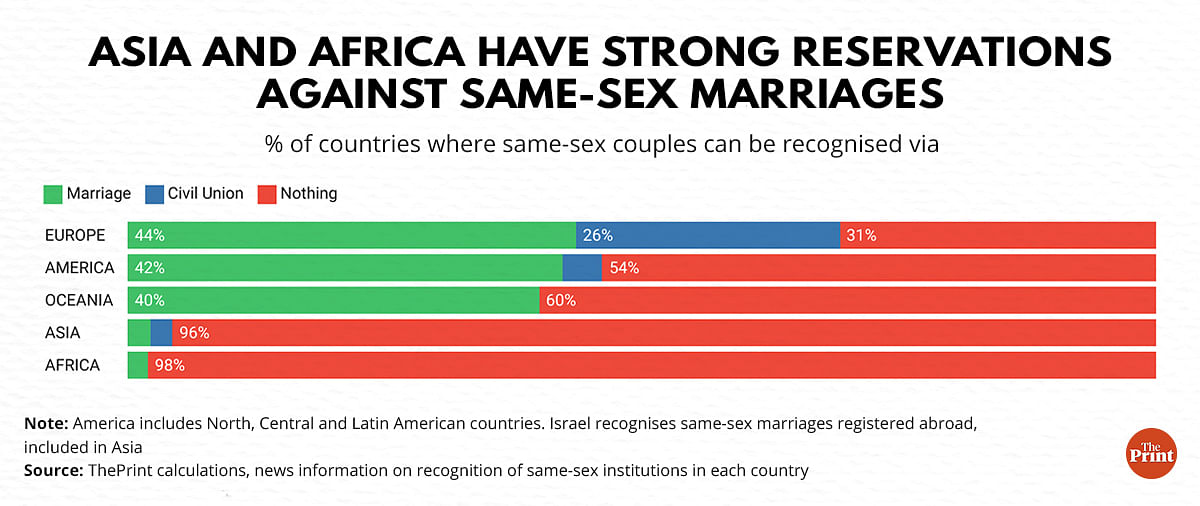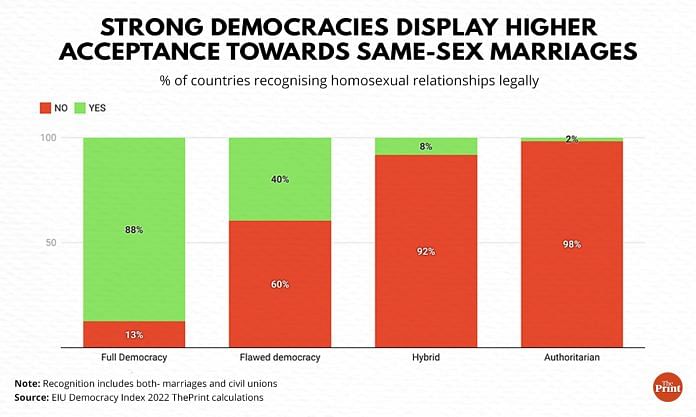New Delhi: The central government’s opposition to legal recognition for same-sex marriages, conveyed to the Supreme Court by Solicitor General Tushar Mehta over the past week, has left India’s LGBTQIA+ community in a state of limbo, five years after the country’s top court decriminalised consensual sex between homosexual couples in a landmark judgement.
The government has, through an affidavit filed in March and verbal submissions by Mehta, disclosed that it perceives support for same-sex marriages as a ‘mere urban elitist view’, which it says is ‘not in conformity with societal morality and Indian ethos’.
How does this opposition square with India’s image as “the mother of democracy”? ThePrint examined the findings of The Economist Intelligence Unit’s Democracy Index 2022 and mapped it to the status of legality of same-sex unions in 167 countries.
As it turns out, same-sex marriages or civil unions are favoured through legal recognition in most robust democracies, but acceptance declines as one moves away from ‘full or flawed democracies’ and in the direction of ‘hybrid or authoritarian regimes’. And on the face of it, the issue seems to be heavily impacted by ‘Western’ culture.
Swaminathan Aiyar, a research fellow at the Washington, D.C.-based CATO Institute, says, “Autocracies do not recognise individual rights as fundamental and inalienable. Autocracies are organised on principles that allow the autocrat to discriminate on any grounds. In such countries, the progress of same-sex rights will naturally be slower or non-existent.”
Also Read: SC asks Modi govt to consider granting benefits to same-sex couples without recognising marriage
Democracies & same-sex marriages
The EIU Democracy Index is based on five broad parameters, namely electoral process and pluralism, functioning of government, political participation, political cultures and civil liberties.
Countries are given a score out of 10, with a score of 8 and above implying that the country is a ‘full democracy’. A score of 6-8 signifies a ‘flawed democracy’, while a score of 4-6 implies a ‘hybrid regime’ — characterised by weaker civil society, higher corruption and government crackdowns on journalists, the opposition and so on. The most contended tag, that of an ‘authoritarian regime’, is accorded to countries that score below 4.
ThePrint’s analysis of these findings, coupled with developments vis-à-vis the recognition of same-sex marriages/civil unions, shows that, of the 24 countries termed ‘full democracies’, 21 of them or about 88 per cent, legally recognise same-sex marriages. Japan, Mauritius and South Korea are the only three ‘full democracies’ that don’t.
In Japan, a court maintained the ban on same-sex marriages last November, but added the caveat that the lack of any legal protection for same-sex couples was also “not good”.
In Mauritius, “sodomy” has been illegal on paper since the days of the British Raj but the norms are obsolete and rarely enforced. And in South Korea, a marriage between a same-sex couple does not amount to legal recognition for them as a de-facto couple.
Among the 48 ‘flawed democracies’, the category in which India is placed, only 19 recognise same-sex marriages or civil unions. This means that these unions are deprived of legal acceptance in about 60 per cent of ‘flawed democracies’.
‘Hybrid regimes’, where democracy exists but is subject to authoritarianism, have an even lower rate of acceptance. Of a total of 36 ‘hybrid regimes’, only three — Ecuador, Mexico and Bolivia — recognise same-sex marriages or unions. This means more than 90 per cent of the countries termed ‘hybrid regimes’ do not grant legal recognition to same-sex unions.
In the case of Mexico, its Supreme Court struck down state laws banning same-sex marriages as unconstitutional in 2015, but delay on the part of states resulted in same-sex marriage receiving legal recognition in all of Mexico only in October 2022.
In Ecuador, its Supreme Court legalised same-sex marriages in 2019, while in Bolivia, another Latin American country, same-sex civil unions were granted legal recognition in 2020 following a protracted legal battle.
Of the 59 countries termed ‘authoritarian regimes’, only one — Cuba — legally recognises same-sex marriages or civil unions. In a national referendum held last year, two-thirds of Cubans voted in favour of amending family laws to grant gay couples the right to adopt.
Religion & homosexuality
An analysis of developments related to legal recognition of same-sex marriages, coupled with the findings of Washington-based think tank Pew Research Center’s Global Religious Landscape report 2012, shows that of the 99 countries where Christians form the biggest share of the population, 39 have granted legal recognition to same-sex marriage.
Of these 39 countries, 25 are in Europe and 12 in the Americas (North, South, Central, Caribbean).

Australia, a Christian-majority country in Oceania, legalised same-sex marriages after Australians voted in its favour via a postal survey in 2017.
And of the 30 Christian-majority countries in Africa, only South Africa recognises same-sex marriages.
None of the three Hindu-majority countries, namely India, Nepal and Mauritius, nor the eight Buddhist-majority countries – Thailand, Mongolia, Sri Lanka, Singapore, Bhutan, Cambodia, Laos and Myanmar – have granted legal recognition to same-sex marriages.
Homosexual marriages are also not legally acceptable in any of the 46 countries where Muslims form the majority.

‘Democratic emphasis on individual rights’
Protection of civil liberties is one of the biggest reasons same-sex marriages receive legal acceptance in stronger democracies, experts believe.
“The fundamental basis of modern democracy, as opposed to say Athenian democracy, is that individuals have inalienable rights that must not be trodden on by the majority,” says Aiyar.
Alluding to the history of democratic reforms in the US and similar democracies, he adds that “the same fundamental democratic emphasis on individual rights that led inexorably to votes for women and slaves are today leading to the recognition of same-sex marriages in democracies”.
On why the central government in India is opposed to legal recognition for same-sex marriages, Aiyar tells ThePrint, “Since India does not have a common civil code, different religious groups have their own rules on marriage and the court wonders whether it has jurisdiction over the marriage rules of individual religious groups. It (court) sees that it may have jurisdiction over marriages recognised under the Special Marriages act, and I suspect it will allow same-sex marriages under this act.”
However, Aiyar says that the judiciary may not direct any religious community to observe same-sex rules it lays down under the SMA until Parliament adopts a Uniform Civil Code.
“In sum, I think India, like other democracies, will provide same-sex couples an avenue for marrying legally, without forcing such recognition on different religious groups,” he adds.
(Edited by Amrtansh Arora)
Also Read: Neither ‘urban’ nor ‘elitist’ — what data shows about Indians’ views on same-sex relationships



